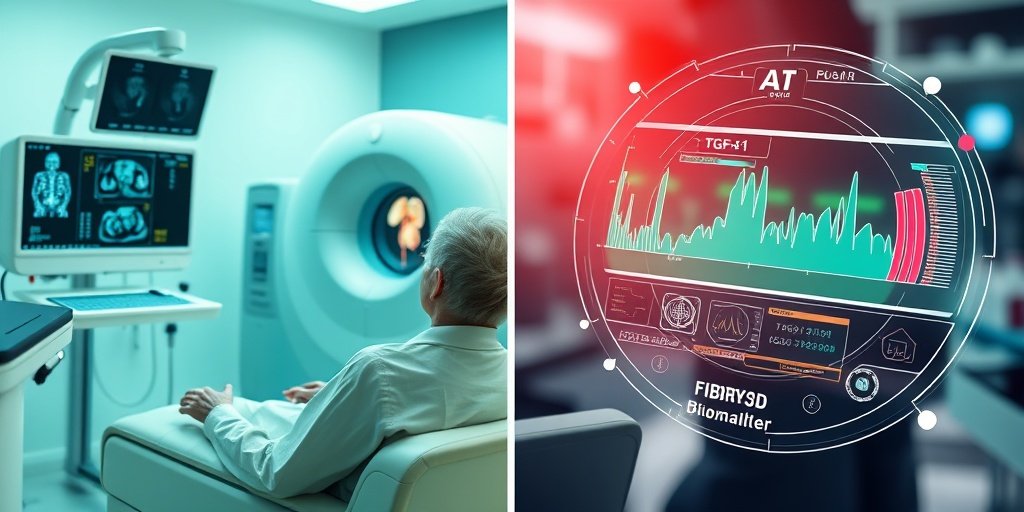⚡ Quick Summary
This review highlights the advancements in non-invasive assessment techniques for renal fibrosis, a key factor in chronic kidney disease (CKD) and end-stage renal disease (ESRD). The integration of artificial intelligence (AI) with imaging and biomarker data shows promise for enhancing diagnostic accuracy and improving patient outcomes. 🌟
🔍 Key Details
- 📊 Focus: Non-invasive techniques for renal fibrosis assessment
- 🧬 Biomarkers explored: TGF-β1 and PDGF-D
- 🖼️ Imaging techniques: Molecular and functional imaging
- 🤖 AI applications: Machine learning algorithms for imaging data
- 📉 Challenges: Small sample sizes, standardization, and model interpretability
🔑 Key Takeaways
- 🔬 Renal fibrosis is a critical process in CKD and ESRD.
- 🩸 Traditional methods like renal biopsy are invasive and limited.
- 💡 Non-invasive biomarkers such as TGF-β1 and PDGF-D are under investigation.
- 🖥️ AI technologies enhance diagnostic accuracy by integrating various data types.
- 📈 Machine learning applied to imaging shows improved predictive capabilities.
- 🌐 Future research should focus on refining biomarkers and improving imaging techniques.
- 🏥 Clinical implications could significantly benefit CKD management and patient outcomes.

📚 Background
Renal fibrosis is a pathological process that plays a pivotal role in the progression of chronic kidney disease (CKD) and can lead to end-stage renal disease (ESRD). Early diagnosis is crucial for effective intervention, yet traditional assessment methods, such as renal biopsy, are invasive and carry risks. This has led to a growing interest in non-invasive techniques that can provide reliable assessments without the associated complications.
🗒️ Study
The review conducted by Tang et al. focuses on the latest advancements in non-invasive assessment techniques for renal fibrosis. It discusses various biomarkers, including transforming growth factor beta 1 (TGF-β1) and platelet-derived growth factor D (PDGF-D), and evaluates their potential for monitoring fibrosis progression. Additionally, it explores emerging imaging technologies and the role of artificial intelligence (AI) in enhancing diagnostic capabilities.
📈 Results
The findings indicate that while biomarkers like TGF-β1 and PDGF-D show promise, challenges regarding their specificity and reliability remain. Furthermore, advanced imaging techniques provide valuable insights but are limited in detecting early-stage fibrosis. The integration of AI with imaging and biomarker data has demonstrated improved predictive capabilities, suggesting a significant leap forward in non-invasive diagnostics for renal fibrosis.
🌍 Impact and Implications
The advancements in non-invasive assessment techniques for renal fibrosis could transform clinical decision-making in CKD management. By leveraging AI and improved imaging technologies, healthcare professionals can achieve more accurate diagnoses and monitor disease progression effectively. This could lead to timely interventions, ultimately enhancing patient outcomes and quality of life. 🌟
🔮 Conclusion
This review underscores the potential of non-invasive techniques in the assessment of renal fibrosis. As research continues to refine biomarkers and improve imaging methods, alongside the integration of AI, we can expect significant advancements in the management of chronic kidney disease. The future of renal fibrosis assessment looks promising, paving the way for better patient care and outcomes. 🚀
💬 Your comments
What are your thoughts on the advancements in non-invasive techniques for renal fibrosis assessment? We would love to hear your insights! 💬 Leave your comments below or connect with us on social media:
Non-invasive assessment techniques for renal fibrosis: advances and perspectives.
Abstract
Renal fibrosis is a critical pathological process driving chronic kidney disease (CKD) and end-stage renal disease (ESRD). Early diagnosis is essential for timely intervention, yet traditional methods like renal biopsy are invasive and present significant limitations. Consequently, noninvasive techniques are gaining attention for renal fibrosis assessment. Biomarkers such as transforming growth factor beta 1 (TGF-β1) and platelet-derived growth factor D (PDGF-D) have been explored for monitoring fibrosis progression, though their specificity and reliability challenges persist. Emerging imaging techniques, including molecular and functional imaging, offer valuable structural and functional insights but remain limited in detecting early-stage fibrosis. Artificial intelligence (AI) has emerged as a promising tool to enhance diagnostic accuracy by integrating imaging and biomarker data. Machine learning algorithms applied to ultrasound, computed tomography, and magnetic resonance imaging have demonstrated improved predictive capabilities for renal fibrosis detection. Furthermore, AI-driven multimodal approaches, combining clinical, imaging, and biomarker data, provide new opportunities for accurate, noninvasive diagnosis and monitoring. Despite these advancements, challenges such as small sample sizes, lack of standardization, and AI model interpretability must be addressed. Future research should focus on refining noninvasive biomarkers, improving imaging techniques, and developing AI-driven models to enhance diagnostic accuracy and clinical applicability in renal fibrosis assessment. This review provides a comprehensive overview of recent advancements in noninvasive approaches for detecting renal fibrosis, highlighting their potential to advance clinical decision-making and ultimately benefiting CKD management and patient outcomes.
Author: [‘Tang Y’, ‘Ke Y’, ‘Ma H’]
Journal: Ren Fail
Citation: Tang Y, et al. Non-invasive assessment techniques for renal fibrosis: advances and perspectives. Non-invasive assessment techniques for renal fibrosis: advances and perspectives. 2025; 47:2555685. doi: 10.1080/0886022X.2025.2555685